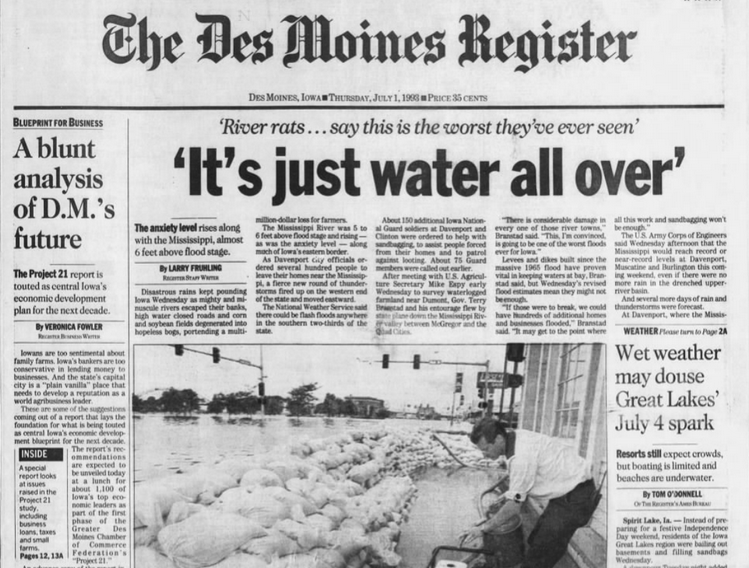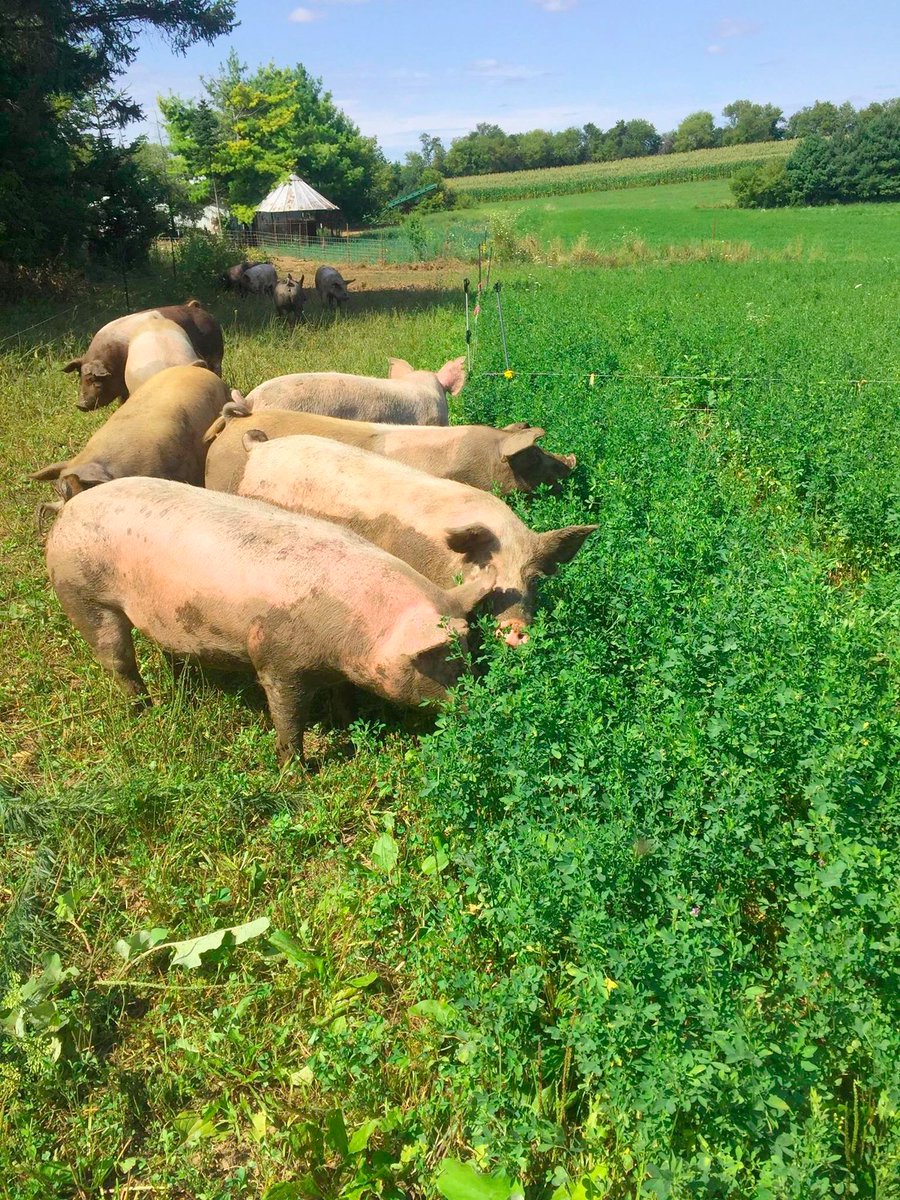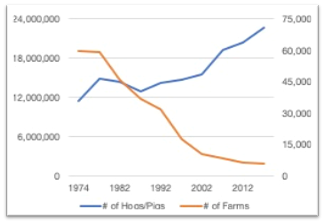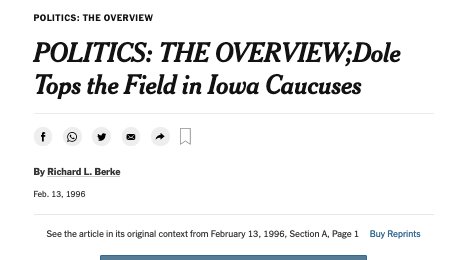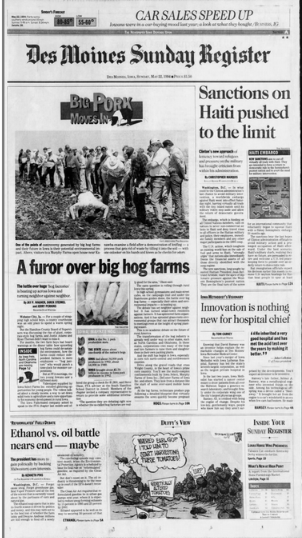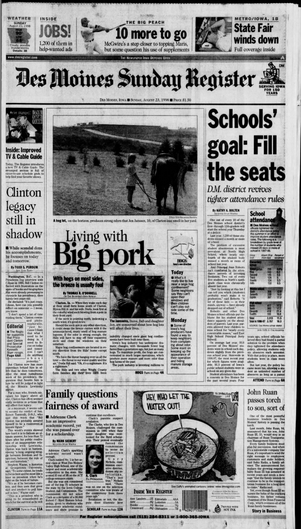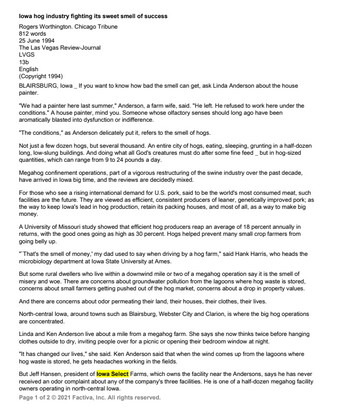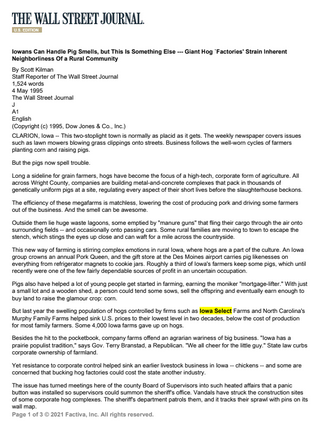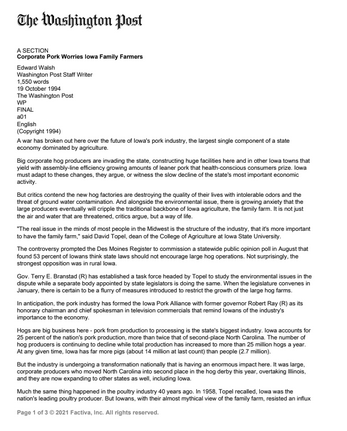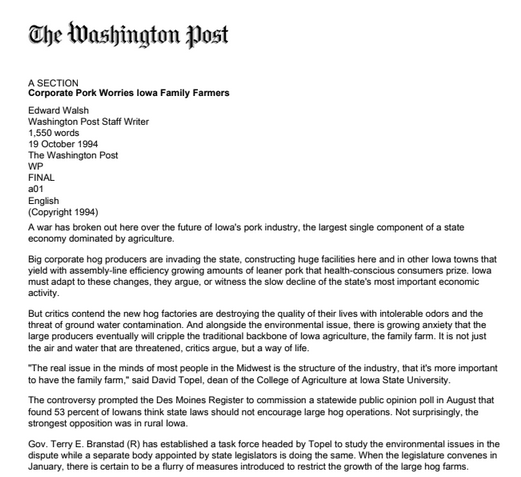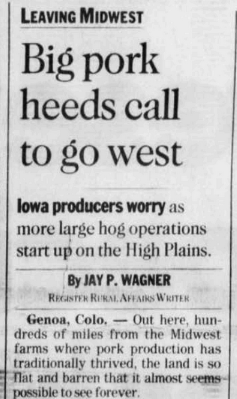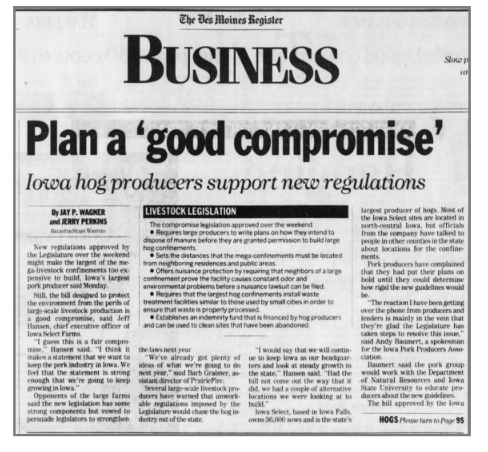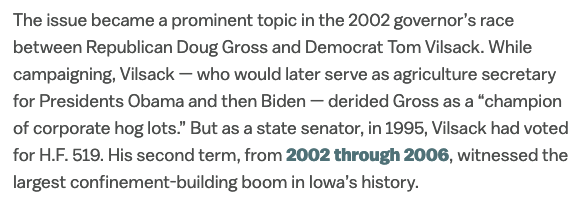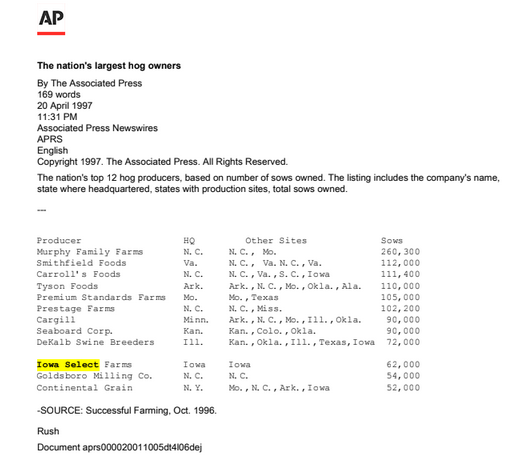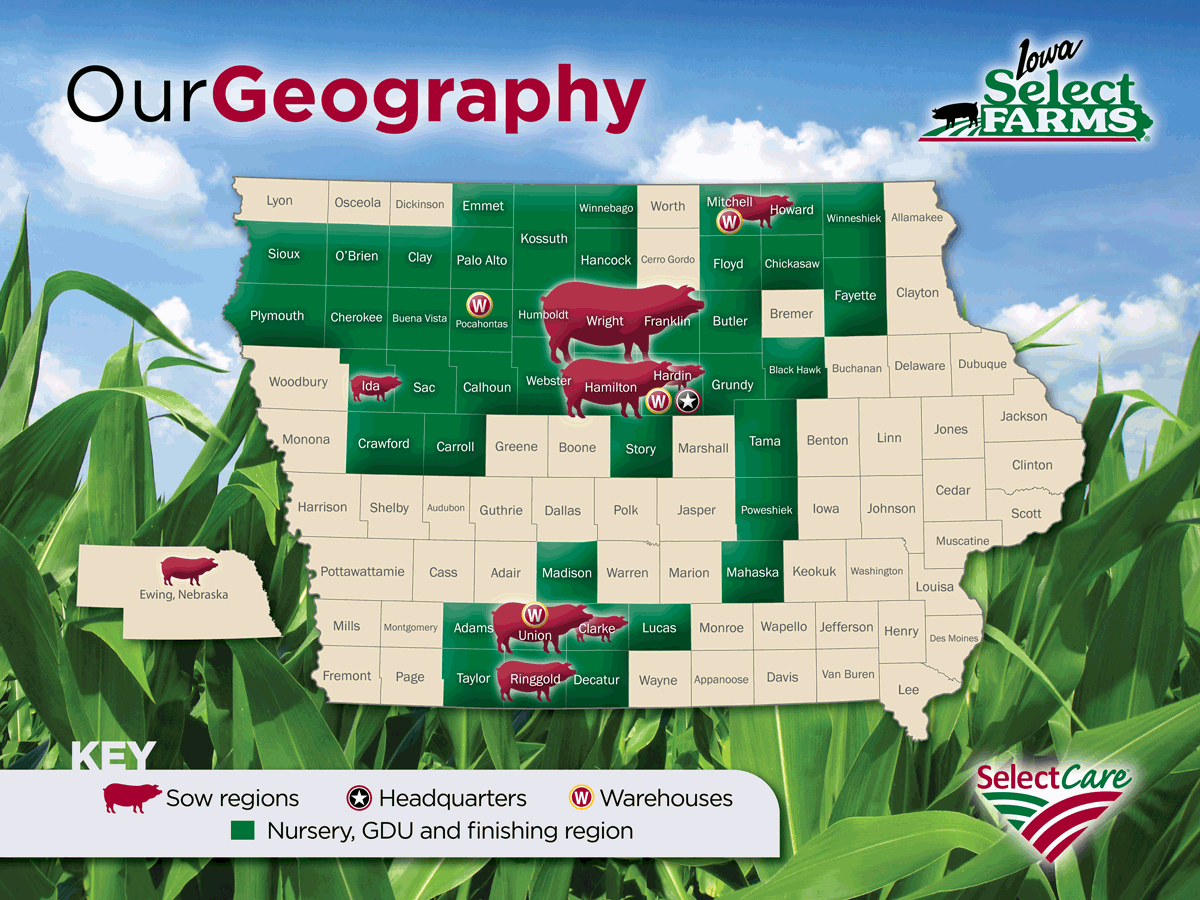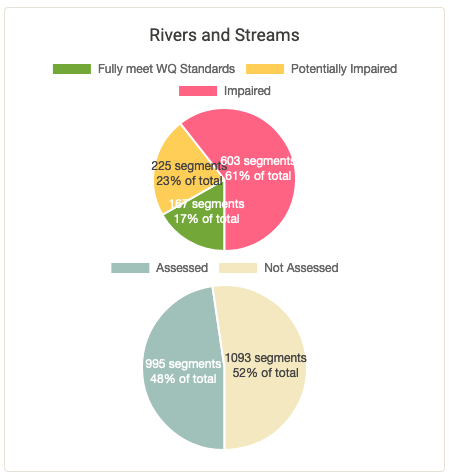1 man, 7K+ employees, and 5m+ hogs
This is the story I wrote w/ @charli3mitchell about the rise of a hog baron and the societal impacts of his concentrated power. #agtwitter #ialegis https://www.vox.com/the-highlight/22344953/iowa-select-jeff-hansen-pork-farming">https://www.vox.com/the-highl...
This is the story I wrote w/ @charli3mitchell about the rise of a hog baron and the societal impacts of his concentrated power. #agtwitter #ialegis https://www.vox.com/the-highlight/22344953/iowa-select-jeff-hansen-pork-farming">https://www.vox.com/the-highl...
This story begins in 1993.
Des Moines business leaders commissioned a VA-based consulting firm to write a report on how to improve IA& #39;s business climate. It chided IA politicians and business leaders for “complacency” w/the state’s relative economic health and low unemployment.
Des Moines business leaders commissioned a VA-based consulting firm to write a report on how to improve IA& #39;s business climate. It chided IA politicians and business leaders for “complacency” w/the state’s relative economic health and low unemployment.
And to shake out of that "complacency," the family farm needed to die.
“Although it is politically popular to defend and protect the concept of family farms,” read the report, “legislation limiting corporate investment is economic folly.”
“Although it is politically popular to defend and protect the concept of family farms,” read the report, “legislation limiting corporate investment is economic folly.”
Keep in mind, driving the fear of elite Iowans was the surging pork production in North Carolina that started in the late 1980s.
But Iowa elites were determined to stay #1 in pork so thus, the race to the bottom had begun. https://twitter.com/AustinFrerick/status/1374678378410696708?s=20">https://twitter.com/AustinFre...
But Iowa elites were determined to stay #1 in pork so thus, the race to the bottom had begun. https://twitter.com/AustinFrerick/status/1374678378410696708?s=20">https://twitter.com/AustinFre...
Let& #39;s stop for a second to talk about what was occurring in the hog industry.
Hogs before deregulation: left.
Hogs afters deregulation: right
Hogs before deregulation: left.
Hogs afters deregulation: right
The hogs on the right are a lot cheaper to produce when:
-Feed is heavy subsidized
-A Dust Bowl era conservation program subsidizes their construction
-Air and water regulations aren& #39;t enforced https://twitter.com/AustinFrerick/status/1384207167104851972?s=20">https://twitter.com/AustinFre...
-Feed is heavy subsidized
-A Dust Bowl era conservation program subsidizes their construction
-Air and water regulations aren& #39;t enforced https://twitter.com/AustinFrerick/status/1384207167104851972?s=20">https://twitter.com/AustinFre...
What happens? Family farms can& #39;t fairly compete against a heavily subsidized corporate model and start going bankrupt left and right.
--->> Since 1992, Iowa’s pig population has increased more than 50% — while the number of farms raising hogs has declined over 80%.
--->> Since 1992, Iowa’s pig population has increased more than 50% — while the number of farms raising hogs has declined over 80%.
But, unbeknownst to us when we started this project, a rural rebellion occurred in Iowa.
For example -- In 1994, 1k+ farmers and rural residents in a town of 2,700 got together to protest the construction of these industrial hog farms.
For example -- In 1994, 1k+ farmers and rural residents in a town of 2,700 got together to protest the construction of these industrial hog farms.
Their demands were simple: They wanted Iowa to enact a moratorium on new confinement construction, or at least give counties the option to deny the necessary building permits.
Imagine thousands of hogs moving in next door and you can& #39;t do anything to stop it.
Imagine thousands of hogs moving in next door and you can& #39;t do anything to stop it.
Right-winger Pat Buchanan even made his opposition to confinements a key part of his 1996 presidential campaign in Iowa. “Farmers talk about it everywhere I go,” he told the LA Times after the Iowa caucuses. “Whenever I bring it up, the audience explodes.”
Heck, according to the NYT, Buchanan’s surprising close-2nd finish in the Republican Iowa caucuses— to Kansas Sen. Bob Dole — elevated him from protest candidate to legitimate contender.
And you can see why non-farming rural residents were rebellion from the horrendous health impacts to their collapsing home values.
The fierce debate over confinements made the front page of the Des Moines Register year after year in the mid-’90s.
Forced to address the heated controversy, industry marshaled their political power to fend off regulation.
The newly formed Iowa Pork Alliance enlisted Robert Ray, a beloved R former governor, to remind Iowans of hogs’ economic importance in statewide TV ads.
The newly formed Iowa Pork Alliance enlisted Robert Ray, a beloved R former governor, to remind Iowans of hogs’ economic importance in statewide TV ads.
In a classic industry move too, it emphasized repeatedly in the press that any efforts to stifle the growth of hog confinements would send production and jobs out of state.
Industry also started flooding politicians with donations.
--->> In 1995, Gov Terry Branstad signed a law that would prove to be pivotal. It essentially cemented in this deregulated framework and took away the ability of local communities to regulate these factories.
--->> In 1995, Gov Terry Branstad signed a law that would prove to be pivotal. It essentially cemented in this deregulated framework and took away the ability of local communities to regulate these factories.
It even became a centerpiece of the 2002 Governor& #39;s race --- but it was all hat and no cattle as they say.
So why were Iowa business and political leaders willing to destroy rural Iowa to stay #1 in pork production? One word: Greed.
Monsanto wanted to sell more corn seeds.
Smithfield wanted to slaughter more hogs.
etc.
Monsanto wanted to sell more corn seeds.
Smithfield wanted to slaughter more hogs.
etc.
Here& #39;s where the Pig Baron comes in: Jeff Hansen of Iowa Select Farms.
He had your normal Iowa background: farm kid etc. But what him different was his confinement construction business. He got in early. https://www.nationalhogfarmer.com/business/2013-master-pork-industry-jeff-hansen">https://www.nationalhogfarmer.com/business/...
He had your normal Iowa background: farm kid etc. But what him different was his confinement construction business. He got in early. https://www.nationalhogfarmer.com/business/2013-master-pork-industry-jeff-hansen">https://www.nationalhogfarmer.com/business/...
He started w/10k sows (breeding momma pigs) in 1992.
In its first 4 years, Iowa Select more than 4x its herd to 62,000, enough to crack the top 10 largest pork producers in the country. By 1999, Iowa Select, with 96,000 sows, was selling 1.7m pigs in a year.
In its first 4 years, Iowa Select more than 4x its herd to 62,000, enough to crack the top 10 largest pork producers in the country. By 1999, Iowa Select, with 96,000 sows, was selling 1.7m pigs in a year.
Today, he is now the 4th-largest hog producer in the country, and owns about 15% of the pork production in Iowa.
His sow herd is 242,500 and growing. https://twitter.com/AustinFrerick/status/1179717766405922817?s=20">https://twitter.com/AustinFre...
His sow herd is 242,500 and growing. https://twitter.com/AustinFrerick/status/1179717766405922817?s=20">https://twitter.com/AustinFre...
Here& #39;s the catch. His empire is mostly based in Iowa so it depends on this lax regulatory environment.
He& #39;s built hundreds of confinement sheds in more than 50 of Iowa’s 99 counties
He& #39;s built hundreds of confinement sheds in more than 50 of Iowa’s 99 counties
Contrary to econ 101 theory -- this baron didn& #39;t become a baron because he sold the best product.
Nah. He floated the regulatory laws and bought-off politicians. In the last Gov race, he gave Kim Reynolds $300,000.
Yes. One pig farmer wrote a 300k check. https://www.thegazette.com/government-politics/iowa-governors-race-unions-big-money-donors-and-multimillion-dollar-hauls/">https://www.thegazette.com/governmen...
Nah. He floated the regulatory laws and bought-off politicians. In the last Gov race, he gave Kim Reynolds $300,000.
Yes. One pig farmer wrote a 300k check. https://www.thegazette.com/government-politics/iowa-governors-race-unions-big-money-donors-and-multimillion-dollar-hauls/">https://www.thegazette.com/governmen...
For example, air quality regulations still haven& #39;t been issued for these confinements after decades of pleading by rural residents and activists.
And yet people still die in these manure pits from the fumes. https://www.desmoinesregister.com/story/money/agriculture/2015/07/28/iowa-father-son-die-manure-pit-fumes/30809037/">https://www.desmoinesregister.com/story/mon...
And yet people still die in these manure pits from the fumes. https://www.desmoinesregister.com/story/money/agriculture/2015/07/28/iowa-father-son-die-manure-pit-fumes/30809037/">https://www.desmoinesregister.com/story/mon...
Heck, the animals can& #39;t even live in these things naturally.
Powerful exhaust fans constantly suck out the ammonia rising from the manure lagoons. Shut off the fans and hogs would die within hours. https://theintercept.com/2020/05/29/pigs-factory-farms-ventilation-shutdown-coronavirus/">https://theintercept.com/2020/05/2...
Powerful exhaust fans constantly suck out the ammonia rising from the manure lagoons. Shut off the fans and hogs would die within hours. https://theintercept.com/2020/05/29/pigs-factory-farms-ventilation-shutdown-coronavirus/">https://theintercept.com/2020/05/2...
In theory, Iowa& #39;s DNR regulates these buildings, but like the IRS, its budget has been gutted.
More and more confinements every year with less and less staff to oversee them. https://www.desmoinesregister.com/story/news/2018/01/19/budget-cuts-threaten-iowa-dnr-mission-lawmakers-told/1040946001/">https://www.desmoinesregister.com/story/new...
More and more confinements every year with less and less staff to oversee them. https://www.desmoinesregister.com/story/news/2018/01/19/budget-cuts-threaten-iowa-dnr-mission-lawmakers-told/1040946001/">https://www.desmoinesregister.com/story/new...
. @iowacci, an organization opposed to confinements, estimates that there have been at least 150 manure or ammonia leaks from this baron alone — each of which resulted in only a small fine. https://www.desmoinesregister.com/story/money/agriculture/2017/10/26/iowas-largest-pork-producer-adding-90-000-hogs-amid-calls-moratorium/800820001/">https://www.desmoinesregister.com/story/mon...
Where are we now --->>
Pigs in Iowa outnumber human residents by a ratio of more than 7 to 1, and they produce a volume of waste equivalent to nearly 84m people, more than the population of California, Texas, and Illinois combined (h/t @RiverRaccoon) https://www.iihr.uiowa.edu/cjones/iowas-real-population/?doing_wp_cron=1617366873.7112309932708740234375">https://www.iihr.uiowa.edu/cjones/io...
Pigs in Iowa outnumber human residents by a ratio of more than 7 to 1, and they produce a volume of waste equivalent to nearly 84m people, more than the population of California, Texas, and Illinois combined (h/t @RiverRaccoon) https://www.iihr.uiowa.edu/cjones/iowas-real-population/?doing_wp_cron=1617366873.7112309932708740234375">https://www.iihr.uiowa.edu/cjones/io...
Waterways in Iowa are basically a sewer.
61% of Iowa’s rivers and streams and 67% of its lakes and reservoirs do not meet basic water quality standards, according to the latest assessment by the Iowa DNR.
61% of Iowa’s rivers and streams and 67% of its lakes and reservoirs do not meet basic water quality standards, according to the latest assessment by the Iowa DNR.
The Des Moines River even was named an endangered river this year from the pollution.
But Iowa& #39;s Sec of Agriculture (and former Monsanto lobbyist) Mike Naig called it "propaganda." https://www.desmoinesregister.com/story/money/agriculture/2021/04/13/raccoon-river-most-endangered-list-american-rivers-iowa-livestock-farm-runoff/7130565002/">https://www.desmoinesregister.com/story/mon...
But Iowa& #39;s Sec of Agriculture (and former Monsanto lobbyist) Mike Naig called it "propaganda." https://www.desmoinesregister.com/story/money/agriculture/2021/04/13/raccoon-river-most-endangered-list-american-rivers-iowa-livestock-farm-runoff/7130565002/">https://www.desmoinesregister.com/story/mon...
Meanwhile, the piggy baron likely can’t see — or smell — any hog buildings from his 7k+ square-foot mansion, which is nestled inside a gated community in suburban DSM. His view is most likely dominated by the golf course at the Glen Oaks Country Club.
In a year where many didn& #39;t travel because of COVID-19, the baron& #39;s jet recorded over 200 flights, including several trips to Naples, FL, where until recently he owned multiple homes on the coast.
Coming up on its 30th anniversary, Iowa Select is still expanding, along with the rest of the hog industry in Iowa. The state is now home to at least 13,000 confinements, and applications hit the DNR office at a steady clip. https://www.stormlake.com/articles/more-hogs-coming-to-northwest-iowa/">https://www.stormlake.com/articles/...
Here& #39;s the thing. Businesses like his are increasingly the norm in farm country: huge, regional-scale corporations owned by just 1 or a few families who, many believe, use their political connections to overpower both local democracy and local businesses. https://story.californiasunday.com/resnick-a-kingdom-from-dust">https://story.californiasunday.com/resnick-a...
The story of Hansen and how he came to wield so much power reveals how decades of deregulation shaped the hog industry — and by extension, the farming methods used to produce the vast majority of the pork that America eats.
. @IowaSelect denied multiple requests for interviews and visits over a period of five months. It declined to comment on the findings of this story and referred Vox to the company’s website for information. https://www.iowaselect.com/ ">https://www.iowaselect.com/">...
But it doesn& #39;t have to be this way.
NC enacted a moratorium. And every year since 2018, IA politicians have introduced a bill in the IA legislature to stop CAFO expansions, and they’ve convinced Sen. @CoryBooker (D-NJ) to introduce a national bill. https://www.agdaily.com/livestock/senate-farm-systems-reform-act-aims-to-eliminate-cafos-in-20-years/">https://www.agdaily.com/livestock...
NC enacted a moratorium. And every year since 2018, IA politicians have introduced a bill in the IA legislature to stop CAFO expansions, and they’ve convinced Sen. @CoryBooker (D-NJ) to introduce a national bill. https://www.agdaily.com/livestock/senate-farm-systems-reform-act-aims-to-eliminate-cafos-in-20-years/">https://www.agdaily.com/livestock...
This also isn& #39;t rocket science. The solution is simple: political courage. Also, it& #39;s politically popular.
A recent poll found that nearly two-thirds of respondents favor a moratorium on new corporate hog facilities.
A recent poll found that nearly two-thirds of respondents favor a moratorium on new corporate hog facilities.
On a personal note, three big thoughts have lingered with me doing this project this past year w/ @charli3mitchell.
1. How crucial local newspapers were to telling this story and on the flip side, how much we& #39;re losing w/Google & Facebook killing local news.
1. How crucial local newspapers were to telling this story and on the flip side, how much we& #39;re losing w/Google & Facebook killing local news.
2. One thing became clear fast in the research: @iowacci
has been fighting the fight from the start against corporate hogs.
An article just as long could easily be written on their efforts. http://iowacci.org/ ">https://iowacci.org/">...
has been fighting the fight from the start against corporate hogs.
An article just as long could easily be written on their efforts. http://iowacci.org/ ">https://iowacci.org/">...
I mention this because I vividly remember a former chair of the @iowademocrats telling me when I served on State Central Committee that they were "crazy" and to stay away from them.
How truly wrong he/she was.
How truly wrong he/she was.
3. Finally, this was a heartbreaking piece to write and research as it& #39;s essentially the story of the corporate capture and destruction of the place I love.
Now, I& #39;d love to hear what you think.
And if this thread caught your eye, please read the whole article. This is only the tip of the iceberg. The stories of people like Julie Duhn add a whole other dimension.
And if this thread caught your eye, please read the whole article. This is only the tip of the iceberg. The stories of people like Julie Duhn add a whole other dimension.
Special thanks to the teams at @FERNnews and @voxdotcom for making this story possible.
It takes a village. This story truly got better with every edit. https://twitter.com/AustinFrerick/status/1384132327219990530?s=20">https://twitter.com/AustinFre...
It takes a village. This story truly got better with every edit. https://twitter.com/AustinFrerick/status/1384132327219990530?s=20">https://twitter.com/AustinFre...

 Read on Twitter
Read on Twitter